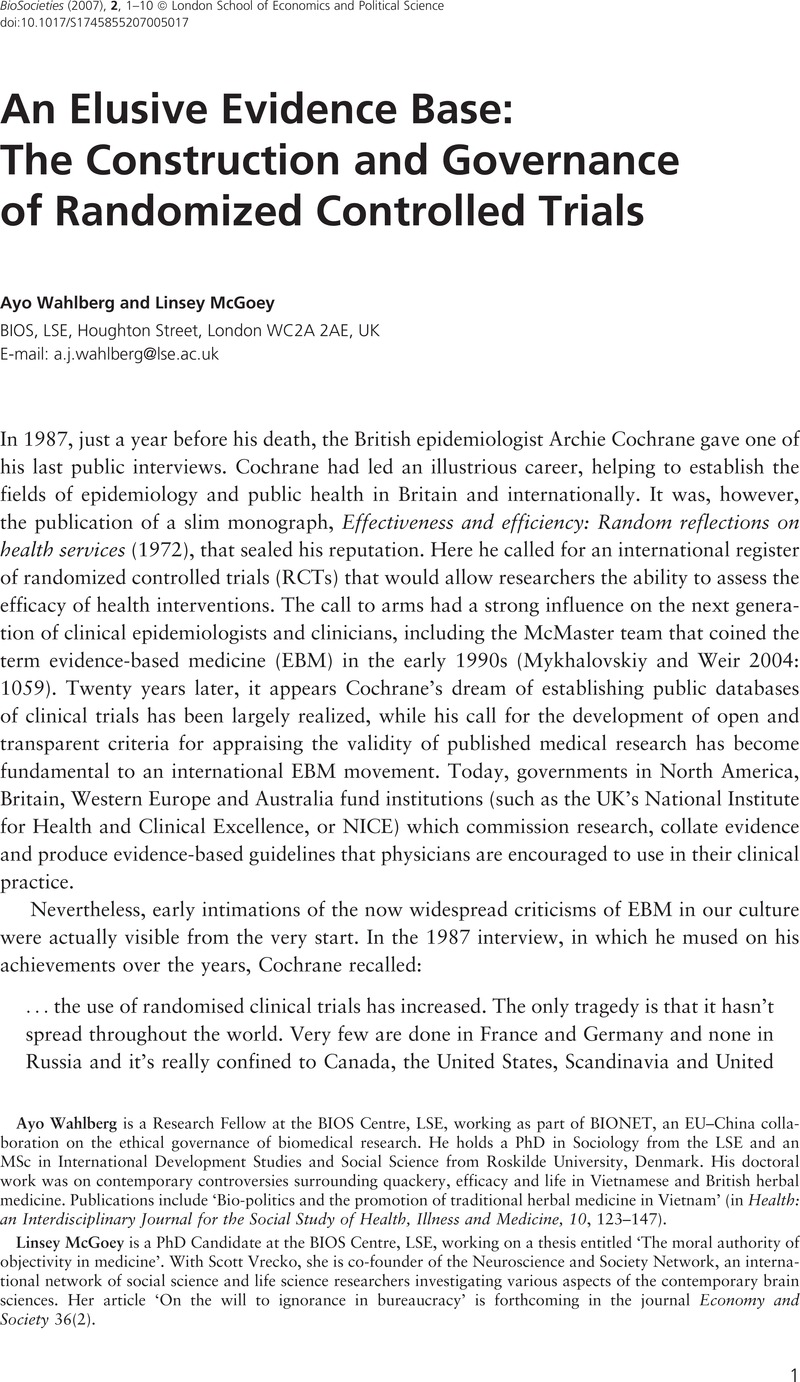Crossref Citations
This article has been cited by the following publications. This list is generated based on data provided by Crossref.
Derkatch, Colleen
2008.
Method as Argument: Boundary Work in Evidence‐Based Medicine.
Social Epistemology,
Vol. 22,
Issue. 4,
p.
371.
Joseph, Stephen
Beer, Charlotte
Clarke, David
Forman, Allan
Pickersgill, Martyn
Swift, Judy
Taylor, John
and
Tischler, Victoria
2009.
Qualitative Research into Mental Health: Reflections on Epistemology.
Mental Health Review Journal,
Vol. 14,
Issue. 1,
p.
36.
McGoey, Linsey
2010.
Profitable failure: antidepressant drugs and the triumph of flawed experiments.
History of the Human Sciences,
Vol. 23,
Issue. 1,
p.
58.
Montgomery, Catherine M
and
Pool, Robert
2011.
Critically engaging: integrating the social and the biomedical in international microbicides research.
Journal of the International AIDS Society,
Vol. 14,
Issue. S2,
Webster, Andrew
Haddad, Christian
and
Waldby, Catherine
2011.
Experimental heterogeneity and standardisation: Stem cell products and the clinical trial process.
BioSocieties,
Vol. 6,
Issue. 4,
p.
401.
Joseph, Galen
and
Dohan, Daniel
2012.
Recruitment Practices and the Politics of Inclusion in Cancer Clinical Trials.
Medical Anthropology Quarterly,
Vol. 26,
Issue. 3,
p.
338.
McLachlan, Andrew
2014.
Preventative Therapeutics: A Study of Risk and Prevention in Australian Mental Health.
Culture Unbound,
Vol. 6,
Issue. 4,
p.
815.
Holmberg, Christine
Whitehouse, Katie
Daly, Mary
and
McCaskill‐Stevens, Worta
2015.
Gaining control over breast cancer risk: Transforming vulnerability, uncertainty, and the future through clinical trial participation – a qualitative study.
Sociology of Health & Illness,
Vol. 37,
Issue. 8,
p.
1373.
Vrecko, Scott
2015.
Everyday drug diversions: A qualitative study of the illicit exchange and non-medical use of prescription stimulants on a university campus.
Social Science & Medicine,
Vol. 131,
Issue. ,
p.
297.
Kingori, Patricia
and
Sariola, Salla
2015.
Museum of failed HIV research.
Anthropology & Medicine,
Vol. 22,
Issue. 3,
p.
213.
Campbell, Jonah
and
King, Nicholas B
2017.
“Unsettling circularity”: Clinical trial enrichment and the evidentiary politics of chronic pain.
BioSocieties,
Vol. 12,
Issue. 2,
p.
191.
Morris, Christopher
2017.
Biopolitics and Boundary Work in South Africa’sSutherlandiaClinical Trial.
Medical Anthropology,
Vol. 36,
Issue. 7,
p.
685.
Hendy, Katherine
2018.
Plant Medicines, Healing and Psychedelic Science.
p.
151.
Kelly, Ann H.
and
McGoey, Linsey
2018.
Facts, power and global evidence: a new empire of truth.
Economy and Society,
Vol. 47,
Issue. 1,
p.
1.
Karfakis, Nikos
2018.
The biopolitics of CFS/ME.
Studies in History and Philosophy of Science Part C: Studies in History and Philosophy of Biological and Biomedical Sciences,
Vol. 70,
Issue. ,
p.
20.
Kelly, Ann H.
2018.
Ebola vaccines, evidentiary charisma and the rise of global health emergency research.
Economy and Society,
Vol. 47,
Issue. 1,
p.
135.
Haddad, Christian
2019.
Embodied values: post-pharmaceutical health and the accumulation of surplus vitality in regenerative stem cell medicine.
Sociologias,
Vol. 21,
Issue. 50,
p.
48.
Sariola, Salla
Jeffery, Roger
Jesani, Amar
and
Porter, Gerard
2019.
How Civil Society Organisations Changed the Regulation of Clinical Trials in India.
Science as Culture,
Vol. 28,
Issue. 2,
p.
200.
Haddad, Christian
2019.
Foucault und das Politische.
p.
281.
Dodds, Catherine
2021.
Remaking HIV Prevention in the 21st Century.
Vol. 5,
Issue. ,
p.
159.



